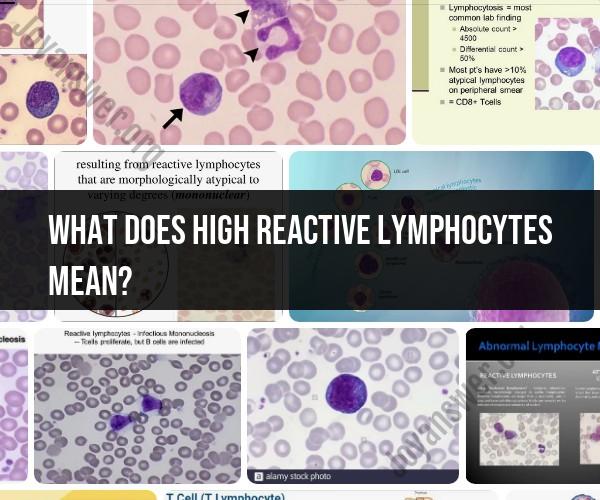What does high reactive lymphocytes mean?
High reactive lymphocytes, also known as reactive lymphocytosis, refer to an increase in the number of lymphocytes in the bloodstream. Lymphocytes are a type of white blood cell that plays a crucial role in the body's immune system. This condition is often identified during a complete blood count (CBC) or blood test.
The presence of high reactive lymphocytes can be an indicator of an ongoing immune response in the body. There are several potential reasons for an elevated count of reactive lymphocytes, and the significance of this finding depends on the underlying cause. Some common causes of high reactive lymphocytes include:
Infections: Reactive lymphocytosis is often a response to infections, particularly viral infections like mononucleosis (caused by the Epstein-Barr virus) or cytomegalovirus. In such cases, the immune system produces more lymphocytes to combat the infection.
Bacterial Infections: Some bacterial infections, like pertussis (whooping cough) and tuberculosis, can also lead to an increase in reactive lymphocytes.
Stress: Physical or emotional stress can temporarily elevate lymphocyte levels.
Autoimmune Disorders: Conditions like lupus and rheumatoid arthritis can cause reactive lymphocytosis as the immune system becomes overactive.
Medications: Certain medications, such as anticonvulsants and antipsychotics, can lead to elevated lymphocyte levels as a side effect.
Hematologic Disorders: Some blood disorders, like chronic lymphocytic leukemia (CLL) and lymphoma, can result in an increase in lymphocytes.
The significance of high reactive lymphocytes is that they indicate an active immune response in the body. In many cases, this is a normal and healthy reaction to an infection or stress. However, if the elevation persists or is associated with other concerning symptoms, it may warrant further investigation to determine the underlying cause.
To properly interpret the significance of high reactive lymphocytes and determine the appropriate course of action, it is important to consult a healthcare professional. Additional tests, such as further blood work or medical evaluations, may be needed to identify the root cause and guide treatment if necessary.
Interpreting "High Reactive Lymphocytes" in Medical Reports
Reactive lymphocytes are lymphocytes that have been activated to respond to an infection or other foreign invader in the body. A high reactive lymphocyte count in a medical report indicates that the body's immune system is responding to something.
Medical Significance of Elevated Reactive Lymphocyte Counts
An elevated reactive lymphocyte count can be a sign of a variety of medical conditions, including:
- Infections, such as viral, bacterial, or parasitic infections
- Autoimmune diseases, such as rheumatoid arthritis or lupus
- Cancer, such as leukemia or lymphoma
- Allergic reactions
- Certain medications
Conditions and Health Issues Associated with Reactivity
Some of the conditions and health issues that can be associated with reactive lymphocytes include:
- Infections: Reactive lymphocytes can be elevated in response to any type of infection, including viral, bacterial, or parasitic infections.
- Autoimmune diseases: Autoimmune diseases are conditions in which the body's immune system attacks its own tissues. Reactive lymphocytes can be elevated in people with autoimmune diseases, such as rheumatoid arthritis and lupus.
- Cancer: Cancer is a condition in which the body's cells grow uncontrollably. Reactive lymphocytes can be elevated in people with cancer, such as leukemia and lymphoma.
- Allergic reactions: Allergic reactions are caused by an overreaction of the immune system to a harmless substance, such as pollen or food. Reactive lymphocytes can be elevated in people with allergic reactions.
- Certain medications: Some medications, such as corticosteroids and antibiotics, can cause an increase in reactive lymphocytes.
Communication and Collaboration with Healthcare Providers
It is important to communicate and collaborate with your healthcare provider if you have high reactive lymphocytes. Your healthcare provider can help you to determine the cause of your elevated reactive lymphocyte count and develop a treatment plan, if necessary.
Here are some tips for communicating and collaborating with your healthcare provider:
- Be honest and open with your healthcare provider about your symptoms and medical history.
- Ask questions if you do not understand something.
- Be involved in your care plan and make sure that you understand the risks and benefits of any treatment options that are recommended to you.
Lifestyle and Health Management Strategies with High Reactive Lymphocytes
Depending on the cause of your elevated reactive lymphocyte count, your healthcare provider may recommend lifestyle and health management strategies, such as:
- Getting enough rest
- Eating a healthy diet
- Exercising regularly
- Managing stress
- Avoiding smoking and excessive alcohol consumption
If you have high reactive lymphocytes, it is important to follow your healthcare provider's instructions and to monitor your condition closely.













